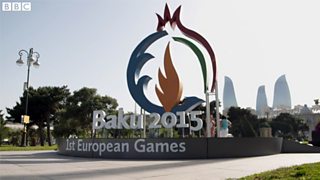Baku’s European Games: Social media stand-off with uncertain future
Leyla Najafli
is a social media producer for BBC Azeri.

Social media is a vital source of information for Azerbaijanis. In a country where the government is accused of increasingly stifling freedom of expression and traditional media outlets are, in essence, exclusively pro-government, social networks like Facebook and Twitter provide a sense of pluralism - at least for those with regular access to the internet.
In the run up to and during the inaugural European Games, being hosted by the Azerbaijani capital Baku, two very different campaigns have been running alongside one another on social media. But they are using very similar methods.
While one side vehemently made propaganda out of Azerbaijan hosting the Games, the other called for a boycott. One side used the #Baku2015 hashtag to promote the Games; the other used it to show people the ‘real’ Baku. Photos of the new shiny buildings and sports venues are juxtaposed with protesters being violently detained: flags and ‘Baku 2015’ logos are mixed in with images of jailed journalists.
Cartoons, caricatures and memes have also played a major role in getting the point across - although the pro-government users often had to play catch-up where creativity is concerned. Opposition activists have been using the Azerbaijani tradition of satirical, political drawings increasingly over the past few years, while young people supporting the Games joined this trend much later.
The first European Games have therefore turned into an opportunity for pro- and anti-government activists to use various media battle to it out. As #Baku2015 was rivalled by the human rights activists’ #RealBaku2015 hashtag, cartoons and caricatures against the Games started to be countered by pro-government tweeters, too. BBC News, BBC Azeri, the Guardian and others were targeted by users co-ordinating the protest against the perceived ‘negative’ or ‘anti-Azerbaijan’ coverage by Western media organisations.

Competing messages on the Baku hashtag
Social media activists have been on the rise in Azerbaijan, particularly over the past six years. As the worst-rated country in the South Caucasus for media freedom, it is perhaps not surprising that Azerbaijan is also said to have the most politically active online presence. But the scene has evolved: where opposition activists were ruling the networks five years ago, over the last year pro-government activists and youth groups have stepped up their social media game.
The government’s retaliation is to brand activists traitors. On a daily basis, opening any number of websites or newspapers will land you on a page that talks about ‘bought out’ journalists or ‘slaves to the Armenian lobby’.
Any dissent - online or otherwise - is labelled anti-Azerbaijani, pro-Armenian or biased by the authorities. The Azerbaijani government has, time and time again, been accused of using spurious charges to silence critics, and online activists are one of the biggest targets, international human rights organisations say.
Today, as dozens of anti-government journalists, bloggers and activists are in jail, human rights groups have even labelled Baku 2015 the “Repression Games”. Many were jailed after Azerbaijan was announced as the host of the event, and whether that undermined either the pro- or anti-Games camps is up for debate. But the clampdown has almost certainly intensified the campaign of human rights activists.
While this large-scale event has been a moment for both sides to shine a light on their respective causes, there are fears about what repercussions there will be for outspoken activists. Many journalists were not accredited to cover the Games, and there are concerns that this ‘blacklist’ will be extended after they are over.
